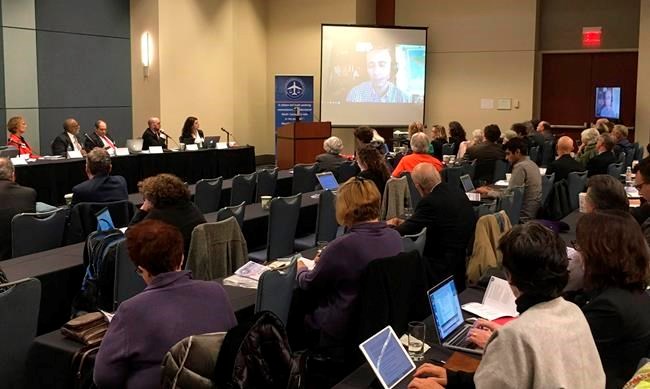A former detainee of Guantanamo Bay is taking legal action against the Canadian government over its alleged role in his 14 years behind bars marked by torture and intimidation.
Mohamedou Ould Slahi, a Mauritanian who lived in Montreal for under two months, filed a $35-million lawsuit Friday alleging that faulty intelligence provided by Canadian authorities contributed to his detention at the U.S. offshore military prison, where he said he suffered fierce beatings, sleep deprivation and sexual assault.
A statement of claim from Slahi, whose story became a bestselling memoir and Hollywood film, states that surveillance by Canada's spy agency and police force was fed to his American interrogators. Eventually their "torture broke him down" and prompted a false confession about a plan to blow up the CN Tower — a building he'd never heard of — the court filings state.
"Canadians need to understand this is a Canadian story," Slahi told The Canadian Press in a message on social media Saturday. "Without Canada I’d never have been kidnapped. Without Canada I’d never have (been) tortured."
Jody Brown, one of two lawyers representing Slahi, described his client's saga as the outcome of a "vicious cycle" of flawed intelligence and so-called enhanced interrogation techniques — torture or degrading treatment of detainees conducted under the George W. Bush administration.
"You provide information, which results in someone's detention. And then even though you're not the party detaining them — you're not the one waterboarding them — when you receive that information back from torture and you act on it, you're justifying it," Brown said in a phone interview, calling the Canadian government "complicit in torture."
Slahi, now a 51-year-old writer-in-residence at a Dutch theatre company, left Canada in 2000 after authorities with the Canadian Security Intelligence Service and the RCMP started questioning him about supposed ties to Ahmed Ressam, the so-called millennium bomber who planned to attack Los Angeles airport. The two had briefly attended the same large mosque in Montreal.
The Federal Court of Canada ruled in 2009 that Slahi, who was once a permanent resident, was not entitled to intelligence documents because the then-detainee was neither a citizen nor subject to legal proceedings in Canada.
The Attorney General of Canada has not yet filed a response to the allegations against CSIS and the RCMP.
CSIS declined to comment on a matter before the courts, or to "confirm or deny the specifics" of any investigations or intelligence shared with foreign states "in order to maintain the integrity of our operations." The RCMP did not immediately reply to questions Saturday.
The surveillance of Slahi during his brief period in Montreal pushed him to return to West Africa, setting off a two-decade pattern of arrests, interrogations and imprisonment, the statement of claim says. He was arrested on arrival in Senegal and interrogated by American officials about the same allegations Canadian authorities had pursued.
"In the aftermath of Sept. 11, 2001, Slahi was again arrested in Mauritania at the behest of the United States. He was kidnapped and transported against his will on a CIA-orchestrated rendition plane to Jordan, where he was interrogated and tortured for eight months, before being rendered to Bagram Airfield in Afghanistan and then onwards to Guantanamo Bay," the statement of claim reads.
He was not released until 2016, remaining under restricted mobility in Mauritania, unable to leave the country until 2020, the court document says.
At Guantanamo, the information that formed the basis for Slahi's interrogations was "absurd," Brown said in an interview.
The filings state, for example, that Slahi's interrogators pressed him about a phone call in Montreal in which he invited someone for tea and asked him to bring sugar.
"His interrogators insisted the request for 'sugar' was code for 'explosives,'" the statement of claim says.
Mustafa Farooq, head of the National Council of Canadian Muslims, said Canada's alleged complicity in Slahi's torture stems from Islamophobic stereotypes.
"The reality is that Mr. Mohamedou was in peril in part because he happened to be praying at a mosque, where he was at the wrong place in the wrong time and happened to come under the surveillance of the Canadian state," Farooq said in a phone interview.
"Part of the reason that it's so horrifying is that the Canadian government and Canadian national security administrations participated in having a man who had done nothing wrong tortured, that we knew about it, and that we tried to make sure Canadians never found out about it."
Farooq drew comparisons to the case of Maher Arar, a Syrian-born Canadian detained in New York in September 2002 and shipped abroad by U.S. authorities.
Ending up in a dungeon-like Damascus prison, Arar gave false confessions about involvement with al-Qaida. He agreed to a $10.5-million settlement in 2007 and accepted an apology from then-prime minister Stephen Harper for "any role Canadian officials may have played" in the affair.
More recently the case of Omar Khadr, a Canadian citizen who at the age of 15 was detained at Guantanamo Bay for 10 years for the wartime killing of a U.S. army sergeant in Afghanistan, also culminated in a $10.5-million settlement with the federal government in 2018.
Slahi said he wants to ensure what happened to him will not befall anyone else.
"I want Canada to promote human rights and democracy. … I want a better future for my son, my nephews and nieces," he said.
"Accountability cannot happen without truth."
This report by The Canadian Press was first published April 23, 2022.
— With files from Jim Bronskill in Ottawa
Christopher Reynolds, The Canadian Press




